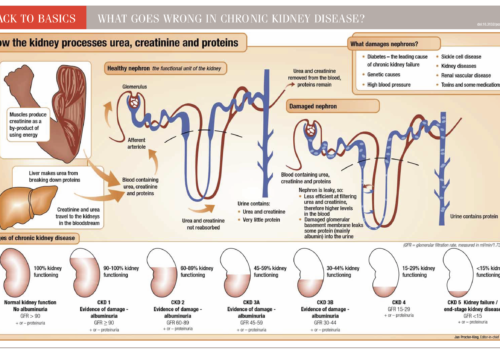Feel the fear and do it anyway.’ That could be the message of this special issue of the British Journal of Primary Care Nursing focusing on chronic kidney disease (CKD). Kidneys can be really confusing for practice nurses, with lots of technical sounding tests and numbers. But the good news is that the step-by-step guides and clear articles in this issue will help you get to grips with this important condition and feel empowered to make a real difference to the health and wellbeing of your patients.
Monitoring Chronic Kidney Disease Practice
The NICE guideline for chronic kidney disease (CKD) was introduced in 2008, with the aim of assisting practitioners both in primary and secondary care in the early identification and management of patients with evidence of kidney disease. However, some debate still exists surrounding the implementation of this guideline in everyday clinical practice. In this article, we sort out
Making Sense of Chronic Kidney Disease (CKD)
What exactly is chronic kidney disease (CKD), what causes it and how is it diagnosed? In this article we get down to the basics of defining what CKD is, and explore the stages of CKD. We review CKD progression and the assessment and management recommendations for each stage of CKD.
Chronic Kidney Disease – Promoting Self-Management
This article will discuss the evidence for the self-management of long-term conditions, with a focus on chronic kidney disease (CKD). Self-management of CKD can include activities to control and manage blood pressure (BP); changes to diet such as reduced salt intake; smoking cessation; and understanding of the action and side-effects of prescribed medicines.
Back to Basics: What goes wrong in chronic kidney disease
Editorial
This spring is an important time for the prevention and management of cardiovascular disease in the UK. The new vascular risk assessment and management programme, now known as the NHS Health Check, starts in April. And it’s the fifth birthday of the British Journal of Primary Care Nursing! So close your eyes and make a wish, and we hope we can play some part in making it come true.
Impaired Glucose Tolerance: What it is and How to Manage it
The new national strategy for vascular risk assessment, now being referred to as NHS Health Check, will include testing for diabetes and impaired glucose tolerance (IGT). This follows a major evaluation of the evidence showing that it is more cost-effective to screen individuals for IGT than screening for diabetes alone, but only as part of the broader vascular risk assessment. This article examines the concepts of IGT and impaired fasting glucose (IFG) and offers practical advice as to how these conditions can be managed in primary care.
You have been Diagnosed with Impaired Glucose Regulation
Understanding the Potential of New Oral Anticoagulant Drugs
Although there are other oral anticoagulation agents available, warfarin is the drug used predominantly in the UK. Warfarin has been in clinical use for over 50 years. It is still referred to by patients as ‘rat poison’ and,indeed, warfarin derivatives are still used as rodenticides.In this article, we take a look at some of the new oral anticoagulants coming along.
The Renal Social Worker: an Essential Team Member for Good Renal Care?
Renal services do not need renal social workers to keep patients alive.Nephrologists, transplant surgeons and renal nurses can manage that challenge without our involvement. So why are social workers attached to a renal service? Are they just an added extra – an upgrade in the service rather than an essential component of it?
Taking an ECG: Getting the Best Possible Recording
An electrocardiogram (ECG) is a quick and non-invasive way of recording the heart’s electrical activity. One of its many uses is in the diagnosis of myocardial infarction, angina, and rhythm disturbances. Although the ECG is a simple and easy test to perform, it is vital to obtain the best possible recording because of its importance.
Keeping it in the Family: Reducing Risk in Relatives of Patients with Premature Heart Disease
In this article, we look at how a primary prevention team introduced a systematic approach to target people who had premature coronary heart disease in their family and offer them a comprehensive cardiovascular disease risk assessment.Based on the findings from the EUROACTION study, the next step was to involve their partners based on the recognition that they often share risk factors due to lifestyle.





















